|
|
|
Sort Order |
|
|
|
Items / Page
|
|
|
|
|
|
|
| Srl | Item |
| 1 |
ID:
107700
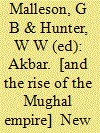

|
|
|
|
|
| Publication |
New Delhi, Low Price Publications, 2008.
|
| Description |
203p.
|
| Series |
Rulers of India LPP -005
|
| Standard Number |
9788175364349, hbk
|
|
|
|
|
|
|
|
|
|
|
|
Copies: C:1/I:0,R:0,Q:0
Circulation
| Accession# | Call# | Current Location | Status | Policy | Location |
| 054899 | 954.02/MAL 054899 | Main | On Shelf | General | |
|
|
|
|
| 2 |
ID:
096688
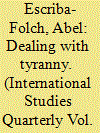

|
|
|
|
|
| Publication |
2010.
|
| Summary/Abstract |
This paper examines whether economic sanctions destabilize authoritarian rulers. We argue that the effect of sanctions is mediated by the type of authoritarian regime against which sanctions are imposed. Because personalist regimes and monarchies are more sensitive to the loss of external sources of revenue (such as foreign aid and taxes on trade) to fund patronage, rulers in these regimes are more likely to be destabilized by sanctions than leaders in other types of regimes. In contrast, when dominant single-party and military regimes are subject to sanctions, they increase their tax revenues and reallocate their expenditures to increase their levels of cooptation and repression. Using data on sanction episodes and authoritarian regimes from 1960 to 1997 and selection-corrected survival models, we test whether sanctions destabilize authoritarian rulers in different types of regimes. We find that personalist dictators are more vulnerable to foreign pressure than other types of dictators. We also analyze the modes of authoritarian leader exit and find that sanctions increase the likelihood of a regular and an irregular change of ruler, such as a coup, in personalist regimes. In single-party and military regimes, however, sanctions have little effect on leadership stability.
|
|
|
|
|
|
|
|
|
|
|
|
|
|
|
|
| 3 |
ID:
097770
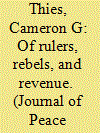

|
|
|
|
|
| Publication |
2010.
|
| Summary/Abstract |
This article investigates the relationship between civil war onset and state capacity through a focus on the role of primary commodities. This is accomplished by moving the focus of the civil war literature away from an almost exclusive concern with the incentives of rebels to a consideration of both rebels and rulers as revenue seeking predators. This predatory theory approach expects that higher levels of state capacity should deter civil war onset, while civil war onset should reduce state capacity. Further, natural resource rents are expected to enhance state capacity, rather than increase the likelihood of civil war onset. In order to deal with the endogeneity posed by including fiscal measures of state capacity in single equation models of civil war onset, this study employs a simultaneous equations framework. This framework allows us to capture the effects of civil war onset on state capacity and vice versa, as well as the effects of primary commodities on both endogenous covariates. The main findings from the statistical analyses include: state capacity does not affect civil war onset, but civil war onset reduces state capacity; and primary products directly affect only state capacity - they do not directly affect civil war onset, as found in previous contributions to the literature.
|
|
|
|
|
|
|
|
|
|
|
|
|
|
|
|
| 4 |
ID:
147048
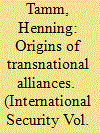

|
|
|
|
|
| Summary/Abstract |
Despite their catastrophic proportions, the Congo Wars have received little attention from international relations scholars. At the heart of these conflicts were alliances between rebel groups and neighboring rulers. What are the origins of such transnational alliances, which have been a major feature of nearly all civil wars in post–Cold War Africa? Recent scholarship on external support for rebel groups does not offer a clear answer, either providing long lists of the goals that state sponsors may have or avoiding the question of motives altogether. A focus on political survival reveals that African rulers form alliances with rebels in nearby states to reduce the threats of rebellions and military coups that the rulers themselves face at home. Transnational alliances serve either to weaken a ruler's domestic enemies by undermining their foreign sponsors or to ensure the continued allegiance of key domestic supporters by providing them with opportunities for enrichment. Case studies of the alliance decisions made in the two Congo Wars by the rulers of Angola, Rwanda, Sudan, Uganda, and Zimbabwe show that their struggles for political survival account for why they sided either with their Congolese counterparts or with Congolese rebels.
|
|
|
|
|
|
|
|
|
|
|
|
|
|
|
|
| 5 |
ID:
144430
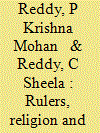

|
|
|
|
|
| Summary/Abstract |
The long-standing American policy of fighting leftist or nonaligned regimes in the Middle East through radical Islamist insurgencies has had disastrous consequences, one of the more recent being the rise of the Islamic State. P Krishna Mohan Reddy and C Sheela Reddy observe that the West now seems confused and unwilling to play a decisive role in the expanding war, which can only be settled through the mediation of the major global powers.
|
|
|
|
|
|
|
|
|
|
|
|
|
|
|
|
|
|
|
|
|